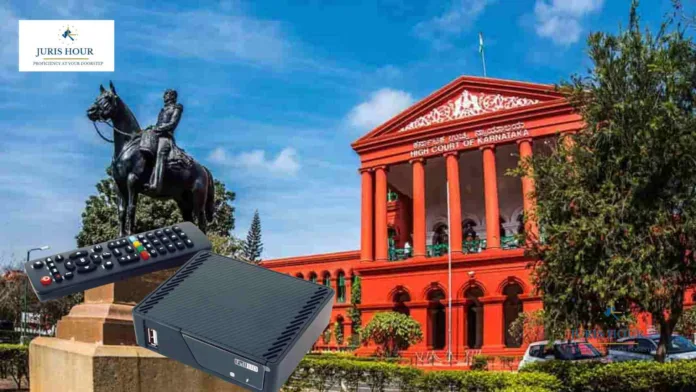The Karnataka High Court has upheld the sales tax payable on set-top boxes.
The bench of Justice Krishna S Dixit and Justice G Basavaraja has observed that Section 174(2) has to be read with sub- section (3) of Section 164. Added, sub-section (4) of Section 174 in a way enacts Sec.6 of the Mysore General Clauses Act, 1899. It cannot be assumed that the tax regime during the transition period between repeal of 2003 Act and enactment of 2017 Act, was ever intended to be left as a vacuum creating a limited/partial tax heaven, in the mere absence of a notification under sub-section (2) of Section 174.
The Karnataka Appellate Tribunal previously ruled that the transfer of the right to use set-top boxes (STBs) to subscribers for consideration constitutes a “sale” under Section 2(29)(d) of the Karnataka Value Added Tax (KVAT) Act. Consequently, the tribunal upheld the levy of sales tax on such transactions.
The petitioners, comprising cable service providers, argued that STBs are merely information appliances and do not qualify as “goods” under Section 2(15) of the KVAT Act. They contended that STBs cannot be used independently by subscribers and serve only as tools for receiving signals. Additionally, they maintained that there was no transfer of the right to use STBs, as ownership remained with the cable operators. According to the petitioners, the subscription charges were solely for activation services, not for the use of the devices.
The petitioners further claimed that the KVAT Act, 2003, was repealed by Section 173 of the Karnataka Goods and Services Tax (KGST) Act, 2017, rendering the sales tax demand invalid. They also challenged the retrospective application of a government notification dated March 15, 2021, issued under Section 174(2) of the KGST Act. This notification stated that authorities under the repealed Acts would continue to hold certain powers under the laws preserved by Section 174 of the KGST Act, effective retrospectively from July 2017. The petitioners argued that the notification could not be applied retrospectively, as the parent statute did not authorize such powers.
Conversely, the Revenue argued that STBs qualify as “goods” under the KVAT Act, as they are movable property used by subscribers to access cable services. It maintained that the transfer of the right to use STBs for consideration constitutes a sale under Section 2(29)(d) of the Act. The Revenue emphasized that subscribers exercise exclusive control over the STBs and that subscription charges include consideration for the right to use the devices. The Revenue also defended the retrospective application of the 2021 notification, asserting that the KGST Act permitted such retroactive enforcement.
The Court sided with the Revenue, ruling that STBs fall under the definition of “goods” in Section 2(15) of the KVAT Act. It noted that STBs are movable property enabling access to cable services and that their transfer for consideration qualifies as a sale. The Court highlighted the broad scope of the term “all kinds of movable property” used in the definition, emphasizing that STBs are not among the specified exclusions.
The Court concluded that the right to use STBs is effectively transferred to subscribers, who exercise exclusive control over the devices. It dismissed the claim that subscription fees were merely for activation, affirming that the charges encompassed consideration for the STBs’ use.
Moreover, the Court upheld the retrospective application of the 2021 government notification, rejecting the argument that a separate notification was needed to activate Section 174 of the KGST Act. It reasoned that if the legislature had intended for Section 174(1) to depend on a notification under Section 174(2), the provision’s language would have reflected that intent. The Court further clarified that Section 174 itself implied the continued effect of the KVAT Act, despite its formal repeal.
The Court also dismissed the petitioners’ claim that imposing both service tax and VAT on the same transaction constituted double taxation. It clarified that the two taxes applied to distinct aspects of the transaction—service tax on the service component and VAT on the sale of goods (STBs).
“There can be levy of more than one tax on a subject matter, if the incidence of each tax is different and imposed under separate statutes,” the Court ruled.
Case Details
Case Title: M/S Atria Convergence Technologies Ltd. Versus Deputy Commissioner Of Commercial Tax
Case No.: STRP NO.19 OF 2024
Date: 18/02/2025
Counsel For Petitioner: Iddharth Bavle
Counsel For Respondent: Aditya Vikram Bhat
Read More: Income Tax Inspector Transfer Policy





